You are viewing 1 of your 1 free articles
Three housing associations leave sector pension fund to set up own schemes
Three more major housing associations have left the sector’s Social Housing Pension Scheme (SHPS), as part of a move to give them greater control over their pension arrangements.
Riverside, Sovereign and Orbit have all quit the multi-employer scheme, which provides pensions for more than half a million people across 500 housing organisations, to launch their own schemes.
SHPS, which is managed by Leeds-based pension provider TPT, has faced an increasing shortfall in recent years and a year ago it emerged that its deficit had risen to £1.5bn.
This growing deficit has meant associations have needed to increase their contributions.
All three associations said they were leaving the SHPS to seek more control over the costs of their pension commitments. Riverside, Sovereign and Orbit have all set up new separate defined benefit schemes with TPT, while Riverside has also launched a defined contribution scheme with Legal & General.
Several other major landlords, including Clarion, Southern, Sanctuary, Bromford and Radian, left SHPS around two years ago.
Riverside, which manages around 56,000 homes, said the changes would give it “greater control over the management of our pension schemes arrangements, whilst ensuring no loss of benefits to members of the scheme”. It said the decision, which took effect this month, came after a period of consultation with staff.
The association’s last annual statement to the end of March 2019 said 115 of its staff were part of SHPS.
Sovereign’s people director Pauline Geldard said: “Having reviewed our arrangements, we decided we wanted more control over the costs and risks that come with keeping our pension promises, as well as offering a great deal for our employees.”
She added that Berkshire-based Sovereign, which launched its new scheme on 30 September, has hiked its contribution to its pension plan to “improve the funding level and long-term security of member benefits”.
Orbit’s group people director Craig Wilcockson said its decision came about after a review last year.
“We wanted a plan that ensured the group had better control over its pension strategy, as well as making sure our members and employees had a larger variety of investment options, was more cost-efficient, and offered an improved user experience,” he said.
Orbit’s new scheme came into effect on 1 October.
Richard Soldan, an actuary at the firm Lane Clark & Peacock who advises on pensions, suggested more associations are likely to leave SHPS. He said: “I’m sure that more associations will follow and no doubt this topic will rise up board agendas once more as other associations consider whether to take a similar step.”
He added that “transferring away from SHPS is definitely not right for all associations”, but said for those that want to take greater control of their SHPS pensions liabilities, risks and costs, “it can be a very positive step”.
Neal Thompson, a partner at First Actuarial, said: “2019 has been a record year for bulk transfers from SHPS and we have been pleased to help a number of our clients to smoothly transfer.
"It may seem like SHPS is dividing into “leavers” and “remainers” but transfers can be a “win win” for all employers.
"Leaving employers can achieve better control of their pension funding. Remaining employers normally benefit from a small increase in their SHPS funding level."
How will this affect me?
If you’re a social housing worker on a defined benefit pension within the Social Housing Pension Scheme, it’s as likely as not that your employer is one of those which will seek to move to defined contributions.
According to Chris Mapp, head of social housing at XPS Pension Group, it is almost certain that this will result in the housing association paying less into your pension, whether this means there is an overall fall in the total contribution or just a rise in the percentage paid by you.
But the main difference, Mr Mapp says, is that where with a defined benefit pension, the risk falls on the employer, with defined contribution, the employee bears the risk.
With a defined benefit pension, an employer guarantees the amount that will be paid out at the end. If the investments made by the pension scheme fail to deliver that amount because of a downturn in the market or something else, the employer makes up that shortfall.
With a defined contribution pension, however, no specific pay-out is guaranteed. Instead, the only thing that is fixed is the amount the employer contributes to it. Therefore, the employee is the one subject to the vagaries of private investments.












